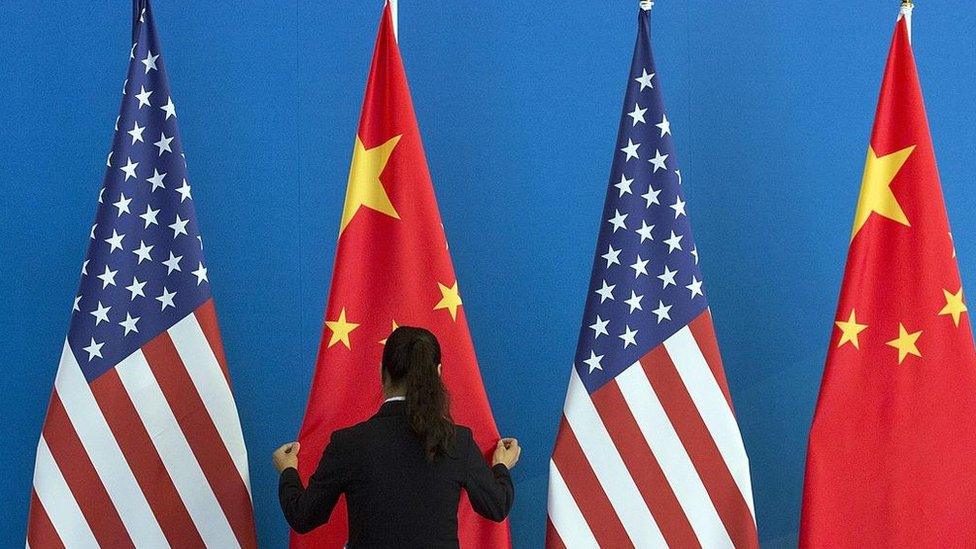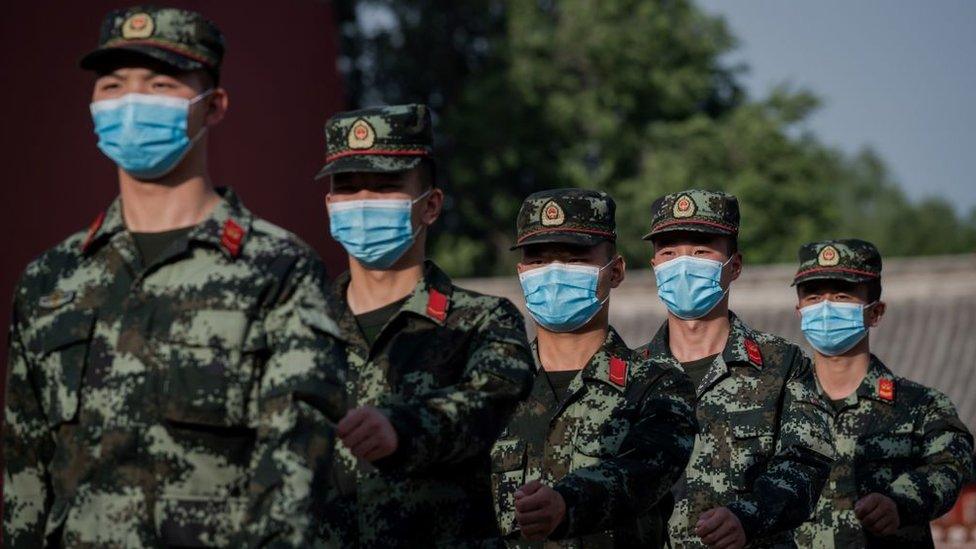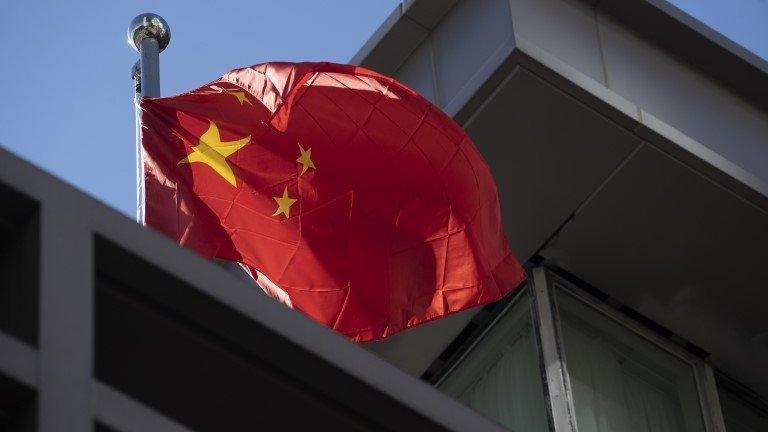US arrests three Chinese nationals for visa fraud
- Published

The US and China have clashed repeatedly in recent months, over trade, coronavirus and Hong Kong
The US has charged four Chinese nationals with visa fraud for allegedly lying about their membership of China's armed forces.
Three are under arrest while the FBI is seeking to arrest the fourth, who is said to be in China's San Francisco consulate.
FBI agents have also interviewed people in 25 US cities who have an "undeclared affiliation" with China's military.
Prosecutors say it is part of a Chinese plan to send army scientists to the US.
Members of the People's Liberation Army (PLA) applied for research visas while hiding their "true affiliation" with the military, US justice department attorney John C Demers said in a press release, external.
"This is another part of the Chinese Communist Party's plan to take advantage of our open society and exploit academic institutions."
The arrests come after the US announced a Chinese scientist had taken shelter in the San Francisco consulate, and the day after US officials ordered the closure of China's mission in Houston, saying it was involved in stealing intellectual property.
Men were filmed acting suspiciously at China's consulate in Houston on Tuesday
On Thursday - before the arrests were announced - Chinese foreign ministry spokesman Wang Wenbin described the US allegations as "malicious slander" and said China "must make a necessary response and safeguard its legitimate rights".
US President Donald Trump has repeatedly clashed with China in recent months, over trade, the coronavirus pandemic and the new Hong Kong security law.
Hours after the charges were announced US Secretary of State Mike Pompeo denounced a "new tyranny" from China.
Speaking at the Richard Nixon Presidential Library in California, Mr Pompeo called on "on every leader of every nation" to stand up to China, adding that securing freedoms from the Chinese Communist Party was "the mission of our time".

What are the charges?
The four individuals charged with visa fraud are Wang Xin, Song Chen, Zhao Kaikai and Tang Juan. Ms Tang is thought to be in the San Francisco consulate.
All the Chinese nationals are said to have lied about their service in the PLA, either stating they had never served in the military or no longer served.
Wang Xin was arrested on 7 June after questioning by Customs and Border Protection agents at Los Angeles International Airport. He disclosed that he remains a PLA member, and works at a military university lab, the justice department release said, having stated on his visa that he had left the military in 2016.

All four of the charged Chinese nationals are allegedly currently serving in China's armed forces
Song Chen and Zhao Kaikai meanwhile were both arrested on 18 July.
Prosecutors allege that Ms Song claimed to be a neurologist who had left the armed forces but in reality was still affiliated with PLA Air Force (PLAAF) hospitals in China, while Zhao Kaikai claimed never to have served in the military but in fact was a member of a top PLA research institution.
Ms Tang is thought to be a member of the PLAAF. An agent found photos of her in military uniform and evidence that she worked at an air force medical university.
She also allegedly wrote on her visa application that she had never been in the military.
FBI agents have also interviewed people in 25 US cities who have an "undeclared affiliation" with China's military, the justice department said.
What is happening at China's consulates?
The arrests come two days after China's consulate in Houston came under scrutiny.
Footage showed people throwing what appeared to be paper into flaming bins. Emergency services were called to the building but Houston police say they were not granted access.
On Wednesday, the administration gave China 72 hours to close the consulate "to protect American intellectual property and Americans' private information".
The consulate is one of five in the US, not counting the embassy in Washington. China described the closure as a "political provocation".
What is stoking tensions between China and the US?
There are a number of flashpoints between Beijing and Washington. Some of the most serious are:
Coronavirus: President Trump has repeatedly referred to Covid-19 as the "China virus". and alleged it originated from a Chinese laboratory, despite his own intelligence officers saying it "was not manmade". In response, Chinese officials have suggested, without evidence, that Covid-19 might have originated in the US
Trade: Mr Trump has long accused China of unfair trading practices and intellectual property theft. The US and China have engaged in a tit-for-tat tariff war since 2018 as a result of the dispute
Hong Kong: China's imposition of a sweeping new national security law in Hong Kong in June led the US to revoke the region's preferential economic treatment. Beijing has accused the US of "gross interference" in its domestic affairs, promising it will retaliate
South China Sea: The two countries have also clashed over Beijing's pursuit of offshore resources in disputed waters, with Mr Pompeo calling it a "campaign of bullying".
- Published23 July 2020
